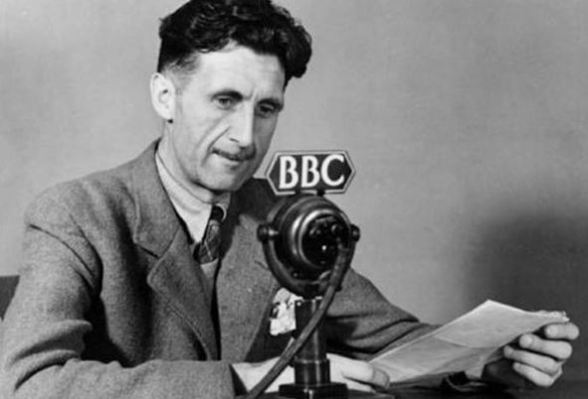I was ready to come to Amazon’s defense (and I will, eventually). In their long letter to the writing community, they made some excellent points. They inflamed our passions, gave us historical context for our discontent, and then quoted none other than George Orwell on the disruptive nature of paperbacks and the need for evil publishers to crack down on upstart, low-priced alternatives.
In the opening paragraph of the letter, Amazon notes the rise of paperbacks and how publishers wailed and gnashed their teeth at the prospect of selling their precious content at lower prices. The colluded. They flailed. Even George Orwell came to their defense. The “Amazon Books Team,” an Orwellian monicker if there ever was one, writes:
The famous author George Orwell came out publicly and said about the new paperback format, if “publishers had any sense, they would combine against them and suppress them.” Yes, George Orwell was suggesting collusion.
The real quote? “The Penguin Books are splendid value for sixpence, so splendid that if other publishers had any sense they would combine against them and suppress them.” It’s clear that Orwell is praising the paperback, not arguing for its abolition. Penguin books, founded by Sir Allen Lane and V. K. Krishna Menon, published beautiful little editions of classic and modern titles, priced at sixpence. They revolutionized learning, bringing about a new respect for the classics and triggered the rise of post-modernism, respect for international thought, and the advent of movements from the Beats to rock and roll.
Only a fool or a businessman would twist that quote so completely. But that’s exactly what Amazon did and that’s horrible.
If you haven’t been following the story, essentially Hachette wants the ability to set its own (higher) prices and Amazon wants everything to hit a nice $2.99-$9.99 sweet spot. After all, as George Bernard Shaw said, “If a book is any good, the cheaper the better.” This has been going on for months, and neither side will budge. Amazon, as always, is taking the high road. They write:
Moreover, e-books are highly price elastic. This means that when the price goes down, customers buy much more. We’ve quantified the price elasticity of e-books from repeated measurements across many titles. For every copy an e-book would sell at $14.99, it would sell 1.74 copies if priced at $9.99. So, for example, if customers would buy 100,000 copies of a particular e-book at $14.99, then customers would buy 174,000 copies of that same e-book at $9.99. Total revenue at $14.99 would be $1,499,000. Total revenue at $9.99 is $1,738,000. The important thing to note here is that the lower price is good for all parties involved: the customer is paying 33% less and the author is getting a royalty check 16% larger and being read by an audience that’s 74% larger. The pie is simply bigger.
This makes perfect sense to most of us, but not to Hachette. Publishers have long controlled pricing, distribution, and advertising. They’ve withheld popular titles, kept shops in bondage, and maintained a classist army of writers who, it seems, are finally figuring out they don’t need a publisher. Hachette doesn’t want to give that up. And maybe they’re right. Publishers have done amazing things. They are stewards of culture, purveyors of new thought, and gatekeepers. Indie wiring has a long way to go. I’ve tried – I’ve really tried – to get into lots of indie writing. I’ve just found that books that have passed through the abattoir of the Big Five are better… for now. That’s why it’s important that this Hachette-Amazon problem be resolved. We need the produce of big publishers just as we need the produce of big movie studios. Art scuttles in the shadows of commerce, fattening itself on the scraps. It has always been thus.
So what does this letter mean? It means Amazon is winning, despite it all. They’re the only side talking, they have addressed the writers directly, they gleefully point to dissenting authors who are excoriating the Author’s Guild and they endlessly play the victim with conviction, saying Hachette just won’t negotiate. And yet they are so ham-handed as to misquote Orwell in an attack post.
“For the price of a modest meal you can ponder the decline and fall of the Roman Empire, the origin of species, the interpretation of dreams, the nature of things,” wrote Carl Sagan. That would have been a better quote, a quote more representative of what Penguin meant to a generation growing up in wartime and upheaval and what the call for cheaper ebooks means to writers and readers. Like it or not, Amazon is going to build another empire of words here and, ostensibly, they have our interests (or at least an interest in our wallets) at heart. The least they can do is not insult the memory of great writers.
